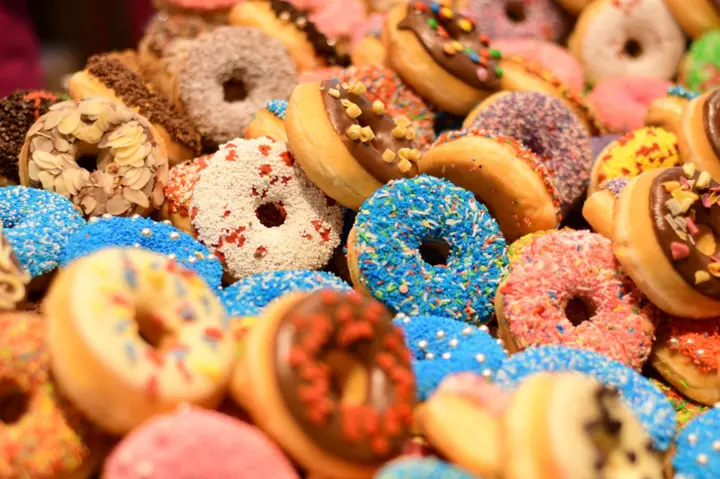8 signs that indicate sugar addiction
Not only does sugar in all its forms add pounds to your body, but research shows that it increases the risk of cardiovascular disease and type II diabetes – and may increase the risk of certain cancers as well. Sugar addiction is no joke, brains can reset themselves to crave sugar, and you can end up showing withdrawal symptoms when you don't get enough sweet things.
Show key points
- Excessive sugar consumption not only contributes to weight gain but also significantly increases the risk of heart disease, type II diabetes, and possibly some cancers.
- Sugar addiction is a real physiological condition that can cause withdrawal symptoms like headaches, fatigue, and irritability when intake is reduced.
- Sneaking sugary foods, hiding them, or making secret deals with yourself to consume sweets are strong indicators of sugar dependence.
- ADVERTISEMENT
- Craving sugar even when you're not hungry, or after full meals, suggests emotional eating and addictive behavior tied to sugar.
- A constant craving for sweets often stems from blood sugar fluctuations and lack of essential nutrients due to poor dietary balance.
- Using sugar as a means to manage stress or emotional distress can be harmful and may prevent proper coping with negative emotions.
- Feeling guilty after eating sugar or going out of your way to satisfy cravings may signal a deeper problem that could benefit from professional help.
Ken Perry, M.D., author of Lies My Doctor Told Me, says: "Sugar addiction is a measurable physiological phenomenon that many people suffer from, but many doctors and dietitians deny its existence, which is very unfortunate. Sugar addiction makes it very difficult for many people to make the nutritional improvements needed to improve their health. Pay attention to signs that you are eating too much sugar. Here's how to tell if your sugar eating habit is addictive.
Recommend
You hide your sugar habit

Some people with diabetes addiction may realize they're eating too much, but instead of finding ways to lower it, they hide it. "Making excuses or making deals with yourself regarding sweets is a sure sign of sugar addiction," says Dr. Perry. "No one hides broccoli in their closet; if you hide sweets, or sneak in to eat them, you're a sugar addiction.
You eat sugar even when you're not hungry

When you're full after a big meal, but still have room for a big slice of cake? The first sign that you are addicted is that you turn to sugar when you are not physically hungry.
You always crave sweets

After excessive sugar intake, your blood sugar level will drop because insulin pushes all that sugar into the cells to prevent sugar damage. This leads to a decrease in blood sugar and an increase in blood cravings. Watch out for these deceptive sources of sugar.
Craving salty foods

Cravings for salty foods are a sign that your body is not getting the nutrition it needs. This is surprisingly common among those who are addicted to sugary foods, as these people are often deficient in essential nutrients. If you find yourself eating sugary snacks regularly, you're probably not eating enough of the healthy proteins and fats your body needs.Salty cravings are one way your body might tell you to take a break from sugar and eat something more nutritious.
The opposite is also true. If you eat too many salty foods, you may find yourself craving sugary foods or simple carbohydrates. The key is balance – eat foods rich in micronutrients and macronutrients that your body needs to function and thrive.
When you try to quit, you will experience unusual symptoms (withdrawal symptoms)

Sugar addiction can be a behavioral addiction, as you get used to eating sugar after meals or at certain times of the day, and it can also be a chemical addiction. So when you leave or interrupt your regular schedule, your body may show signs of distress or withdrawal. Abruptly quitting sugar can lead to withdrawal symptoms in the body. Some of the most common symptoms of sugar addiction may include headache, lethargy or feeling tired, cravings, muscle pain, nausea, gas and bloating, and even insomnia. In most cases, these symptoms worsen after 24 hours. The best way to give up sugar is slowly, by reducing it a little at a time.
If sugar is used to calm down

If you're craving something sweet after a breakup, a sad movie, or a bad day, beware. Because one of the psychological symptoms of sugar addiction is that individuals constantly resort to sugar as a way to deal with life stressors, boredom or other psychological problems such as depression or anxiety. Indulging in sugar for such emotional relief is completely unhealthy, as it does not allow an individual to feel or deal with their feelings properly. One recent study suggests that they don't even improve mood.
Doing the impossible to get sugar

If you're making private late-night trips to the gas station to pick up a serving of ice cream, you should take a closer look at your priorities, according to the Addiction Center. This is a clear sign that your need for sugar is getting out of control.
You have guilt about eating sugar

Feeling guilty about eating any food may be a sign of an eating disorder. If you're ashamed of your sugar habit, you may want to discuss this with your doctor or therapist. Watch out for these silent signs that indicate you may have an eating disorder.








